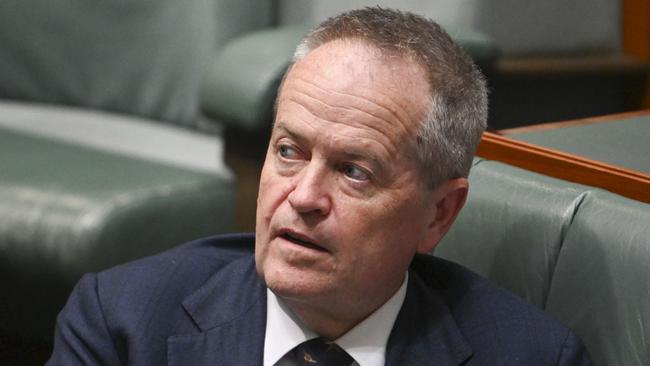NDIS eligibility to be clarified, says Bill Shorten
Parliament has paved the way for Labor to embark on the biggest changes to the NDIS since the inception of the disability scheme more than a decade ago, with Bill Shorten turning his focus to eligibility.

Labor will look at changes to eligibility for the NDIS in its next tranche of reforms that will come “in conjunction” with a new system of disability services from the middle of next year, following the passage of landmark legislation on Thursday that Bill Shorten says gives the government “the legal authority” to do so.
Questions over whether Labor would turn its attention to reforming eligibility of the $40bn-a-year scheme had been raised since the government announced it intended to slash growth of the scheme by half, down to 8 per cent a year, by mid-2026.
When asked whether the target would be achieved through the new limits to what NDIS participants could and could not claim – which will come into force next month as part of the legislation passed this week – NDIS Minister Mr Shorten said there were more reforms to come.
“We’re going to work to develop clarity about eligibility and access to the scheme,” he said.
“This legislation just gives us the legal authority to start that conversation with people with disability. Our aim is to do it in conjunction, concurrently with the development of supports for people outside of the scheme.”
The legislation that passed with the help of the Coalition, represents the biggest change to the NDIS since its inception more than a decade ago, with Mr Shorten set to face a major battle from the Greens and advocates at the next election over reducing costs in the program.
The bill limits the services that can be claimed with NDIS funds, changes how people’s needs are assessed before getting on to the scheme and forces some participants – including those who commit offences punishable by two or more years in prison – to have their plans managed by the disability agency.
Mr Shorten said the new Bill would make a big difference disabled Australians. “The NDIS is a great chapter in the history of disability in Australia, but it’s not the book,” he said. “We want to write a new chapter about foundational services working with the states. Heaven help us if the Greens were ever in charge of the NDIS, because they are dangerous.”
Greens disability spokesman Jordon Steele-John said “people will die because of this bill” and the legislation “represents the greatest betrayal of disabled people and our families in the history of this country”.

“We shall grieve for those that we know we will lose. We will rage against the dying and we will remind both parties … that we are not only fearless advocates, we are not only community members, we are voters, and as voters, we will mark your card for this; we will remember it on election day,” he said.
“We shall go into the ballot box and deliver back to this place a parliament that will listen.”
There are more than 660,000 people on the NDIS and more than four million Australians with some form of disability.
Senator Steele-John hinted that “correcting this betrayal” when it came to the design of the NDIS would be a major red line for the Greens in negotiating with any Labor minority government.
The legislation was passed after Mr Shorten secured the backing of states and territories through amendments that gave them more oversight of reforms, following concerns Labor was risking the “co-governance” principles of the scheme.
Greens leader Adam Bandt said a “fully funded NDIS” would be a major part of his party’s election platform.
While Labor supported several Coalition amendments, including banning sex work, drugs and alcohol from being funded by the NDIS and ensuring people with serious criminal convictions could not self-manage their plans, former Coalition NDIS minister Linda Reynolds and her Liberal colleague Maria Kovacic abstained from the final vote.








To join the conversation, please log in. Don't have an account? Register
Join the conversation, you are commenting as Logout